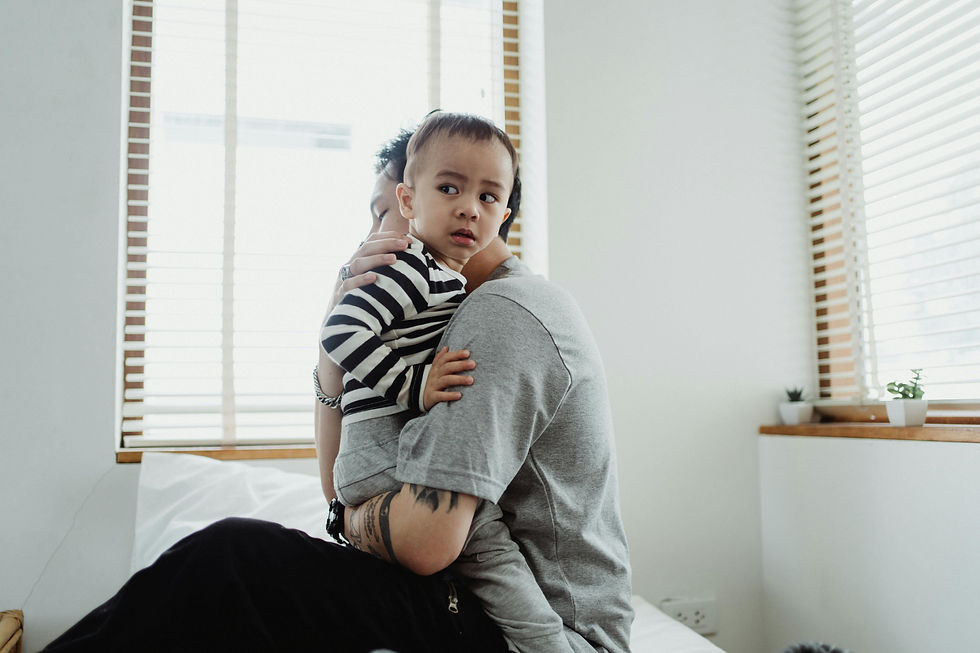Understanding and Supporting Fears in Young Children
- Marianela de Sousa
- Oct 22, 2024
- 4 min read

Why does my child fear the dark? Is it normal for them to be scared of loud noises? How can I help them feel safe and brave? These are common questions many parents ask when their children experience fears. It’s important to recognize that in the early years of life, fears are natural and part of a child’s emotional development. At this age, the brain is rapidly growing and learning, and some fears emerge as a way to protect themselves against the unknown.
Fears in Child Development
Common Fears in Young Children
Research in the field of developmental psychology indicates that approximately 50% of young children experience some form of fear. The most common fears include:
Fear of the dark
Fear of animals
Fear of loud noises
These fears typically emerge between the ages of 2 and 6, coinciding with the development of imagination and the ability to think symbolically. A study published in Child Development by the Society for Research in Child Development suggests that these fears serve an adaptive function, helping children learn about their environment and develop essential coping skills for their emotional and social growth.
Expert Perspectives
Álvaro Bilbao, a Spanish neuropsychologist and author of The Child’s Brain Explained to Parents, explains that fears in childhood are natural responses that the brain develops to protect children. Instead of viewing them negatively, we should see them as opportunities for children to learn to manage their emotions with the support of their parents and caregivers.
Similarly, Jesper Juul, a Danish educator and author of The Competent Child, encourages not to eliminate fears but to accompany children with empathy and respect. Validating their emotions and providing a safe space for them to express their feelings is essential for children to feel understood and secure.
Tips for Families: How to Manage Fears at Home
To effectively support their children at home, parents can follow these practical tips based on the teachings of Álvaro Bilbao and Jesper Juul:
1. Validate and Listen to Their Emotions
When your child expresses fear, validate their feelings by saying something like, “I understand that the dark scares you. I’m here with you.” This gives them the confidence to express their emotions.
2. Create a Predictable Routine
Pre-bedtime routines, such as reading a story or singing a song, can help children feel secure during times when fears are more common, like bedtime.
3. Use Play as a Tool
Symbolic play is an excellent way for children to process their fears. Encourage them to play out their fears with dolls or figures, giving them the opportunity to feel brave in a controlled environment.
4. Explain Fears Simply
Talking in simple words about what they’re feeling helps the child understand that fear is normal and that you are there to support them.
5. Provide a Comfort Object
Sometimes, having a special object like a stuffed animal or a blanket can give the child a sense of protection and calm, especially in situations where they feel vulnerable.

What Not to Do
It’s equally important to know which behaviors to avoid when supporting children in managing their fears:
1. Minimize Their Feelings
Avoid phrases like “There’s nothing to be afraid of” or “Stop being a baby.” This can make the child feel that their emotions are invalid and may lead to repressing their fears.
2. Force Them to Face Their Fears Too Soon
If a child is afraid of the dark, don’t force them to enter a dark room without preparation. It’s better to introduce the situation gradually so they feel safe.
3. Punish or Shame the Child for Their Fears
Making the child feel that their fear is a problem can increase anxiety. Instead, it’s essential to create an environment where they feel safe to share their feelings.
4. Compare Them to Other Children
Avoid saying things like “Look at your friend, he’s not afraid.” Every child is unique and faces their own challenges; comparing them can increase their insecurity.
5. Withdraw Emotional Support Abruptly
It’s important for parents to be present when their children face fears. Withdrawing or showing disinterest can make the child feel alone and vulnerable.
Professional Support
At ABCnMe, we create a nurturing environment that fosters safety and confidence in every child. Our activities are designed to promote emotional well-being, helping children express and manage their fears with ease.
We collaborate closely with families to support children in overcoming their fears in healthy and constructive ways. Our experienced educators use proven strategies to build resilience and emotional strength, ensuring your child thrives both emotionally and socially.
Recognizing that each child is unique, we tailor our approach to meet individual needs. Whether your child is dealing with common fears or specific anxieties, our team offers personalized support and resources to guide them. At ABCnMe, we are here to support you and your child every step of the way, ensuring a positive and enriching early education experience
Conclusion
Understanding and supporting fears in young children is fundamental to their emotional and social development. By validating their emotions, creating secure routines, and using tools like play, parents can help their children feel safer and braver. Avoiding behaviors that minimize their feelings or shame them is crucial to fostering an environment of trust and support.
Remember that each child is unique and faces their own challenges. With patience, empathy, and the right strategies, you can help your child overcome their fears and grow in a healthy and secure manner.




Comments